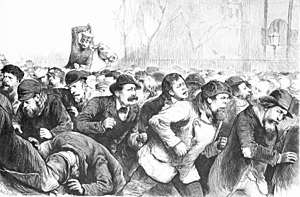Gilded Generation (Strauss–Howe theory)

The Gilded Generation is the name given by sociologists to describe the generation of American people, born 1822–1842. It is an identified cohort within the Strauss–Howe generational theory.
They came of age amid rising national tempers, torrential immigration, rampant commercialism, conspicuous consumerism, declining college enrollment and economic disputes. This led to a distrust of Zealotry and institutional involvement, shifting focus to a life of materialism. As young adults, many pursued fortunes in frontier boom towns.[1]
Members of this generation were also of age by the time the American Civil War began.
Notable persons
Some of the notable persons who influenced this generation include Mark Twain, JP Morgan, Jay Gould,[2] John D. Rockefeller, Ulysses S. Grant, Louisa May Alcott and Lewis Carroll.
See also
References